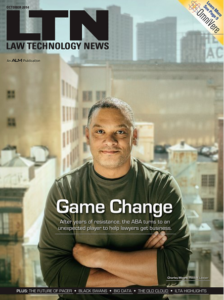ABA, Rocket Lawyer
In 2014, when the American Bar Association and Rocket Lawyer announced that they were going to create a pilot project, “ABA Law Connect,” designed to help small businesses and individuals get access to affordable legal services—and help lawyers find clients—I wasn’t the only lawyer who was skeptical.

I immediately wrote a cover story for Law Technology News and the first sentence was “Hell may have just frozen over.”
To understand why requires a bit of context and a history lesson. From 1985 until I transferred to New York, my primary assignment at The Recorder was covering the organized bars, and I spent a lot of time covering the ABA. I also had inside experience: as a night law student at the University of San Francisco (1978-82) I went “up the ladder” of the ABA’s Law Student Division and was elected National Vice Chair (back in the days where women were not voted into chair positions).
During those years, the ABA and other state and local bars fought tooth-and-nail against non-traditional access to legal advice, waving the flag of UPL (unauthorized practice of law) to protect the fiefdom of law. The State Bar of Texas and the Supreme Court of Texas actually tried to ban self-help books and software from Nolo Press. (Yes, the same bar that in 2014 banned non-lawyer professionals from having titles with the words “officer” or “principal.”)
Simultaneously, lawyer advertising was banned or strongly “discouraged.” For example, in California, if you mailed anything to potential clients, you had to include a disclaimer on the envelope stating that the mail included “advertising.” ( I sat through a three-hour State Bar committee meeting in a hot hotel room in Los Angeles, where the group debated the size of the font that would be required on the envelope.)
At the same time, I remember attending, year after year, inaugural parties at local, state and national bars, where the newest white male president would pound his chest and earnestly declare that he was going to focus his year tenure on “access to justice for the middle class.” And nothing would happen.
No wonder small firm lawyers have had such a hard time trying to find and serve clients.

So it’s probably not a surprise that I’ve always been an advocate for self-help tools and affordable access to legal services. And it’s why I wasn’t optimistic, given the long history, that the ABA-Rocket Lawyer pilot project would be a success. But I didn’t expect that it would last just barely more than three months, launching officially on Oct. 1, 2015 and ending on January 10, 2016.
But there’s no point for tears. The pilot program was and is a very important step. With the continuing rise of legal technology, the potential for improved access for both clients and lawyers is exciting. Ironically, it’s always been the “dirty little secret” that lawyers (especially small firm attorneys) were often hurt as much as potential clients when the organized bar zealously attempted to prevent outsiders from helping both. (I always got a kick out of how so many new lawyers bought Nolo books.)
This also is a reason to be so passionate about what we’re doing at CodeX— creating ideas, energy and expotential change. There’s no “no” in this adventure. Legal tech is the key to “better/faster/cheaper/transparent” and we’re seeing, first hand, fresh startups that are going to change the world. And that’s not hyperboly, we’ve already seen dramatic change over the recent decades.
Just look at the maturing of companies such as Rocket Lawyer, Avvo, LegalZoom, Nolo —and the potential of startups (e.g., Steven Kane’s ArbiClaims and Dan Rubins’ Legal Robot, among many others) that are creating options to serve and empower small businesses, families and individuals—and even Big Law! Sure, not every startup is going to be the next Google, Amazon or Apple. But sometimes it’s a good idea to look back and remind ourselves of how our own lives have quickly changed due to tech, most for the good. (Granted, I wish I hadn’t spent so much money on 8-tracks, vinyl and CDs, but that’s another story. : )
My thanks to Charley Moore for his thoughtful insights in a Q&A, “Rocket Lawyer CEO On the Quick Demise of ABA Pilot Program,” for Bloomberg BNA Big Law Business, which was published this afternoon. He puts things into perspective, and it’s positive.
Said Moore: “We are disappointed that a few individuals chose protecting their lawyer referral revenue and high fees, over innovation, fair competition and the public’s need for wider access to attorney advice. Still, it’s inspiring that the ABA and State Bar of California leadership share our paramount commitment to bring the fundamental right of legal representation to everyone, regardless of their economic means.”
See also:
The American Lawyer, Susan Beck:
• “ABA Abandons Rocket Lawyer Venture Amid Attorney Backlash.“
• “Divided ABA Adopts Resolution on Nonlawyer Legal Services.“
• “At ABA Meeting, Bar Groups See Threat from Nonlawyers.”
(Registration and/or fees may apply for current ALM stories, and a LexisNexis account may be required to access older links.)
CodeX Blog
• Startup Watch
• “Shark Bait“
Monica Bay is a Fellow at CodeX and a member of the California bar and the American Bar Association. Email: mbay@codex.stanford.edu. Twitter: @MonicaBay
